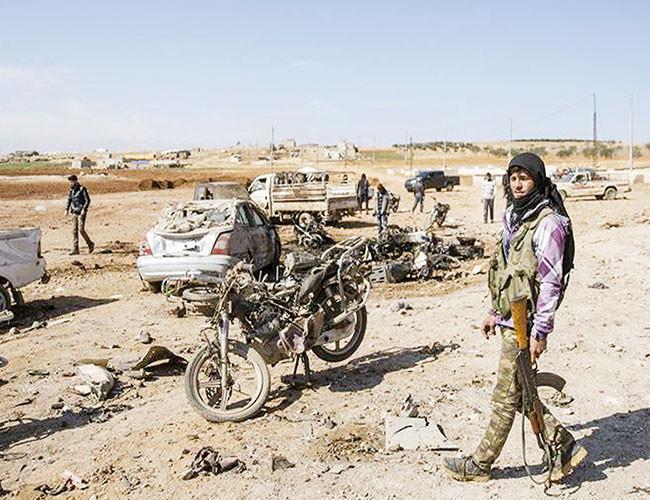ISIL conducted over 4600 attacks worldwide in 2017, despite major territorial loses: NATO
Sevil Erkuş - BRUSSELS

The Islamic State of Iraq and the Levant (ISIL) conducted more than 4,600 attacks worldwide in 2017, even though the group has experienced serious territorial loses, according to an analysis made by the NATO’s intelligence unit.
As the ISIL is defeated militarily in Syria and Iraq, the jihadist militant group has been changing its recruitment strategy and attack style.
“When faced with pressure, terrorist groups are often able to adjust their modus operandi. Throughout 2016-17, senior ISIL leaders adopted their organization to these new realities. For example, granting greater autonomy to its branches, to regional affiliates, basically decentralizing the organization,” a NATO official told Hürriyet Daily News on condition of anonymity.
The official expressed the NATO’s concerns that despite losing territory the group has managed to keep its ideology strong enough to recruit new fighters.
“We observe with great concern that despite intense efforts by the international community to defeat the ISIL, the ideological power of the group remains strong. They are still able to recruit and inspire attacks,” the official said.
Last year, the NATO established a terrorist intelligence cell, which combines operational capability with strategic level analyses to help decision-makers understand current terrorist threats and to raise situational awareness. Intelligence information from various allies about developing threats are accumulated and assessed at this unit.
The group’s changing strategy means an increased focus on “lone wolves” carrying out terrorist attacks, but in less sophisticated methods, so that casualties are fewer than previous attacks, the official noted.
“For example, in 2017, we noticed a shift away from more complex terrorist attacks into more inspired terrorist attacks, often carried out by lone wolves. These are proven to be less sophisticated and sometimes less deadly with fewer casualties,” said the official.
The ISIL has adopted a propaganda and recruitment tactic that clearly favors “inspiring individuals” to conduct these attacks, said the NATO official noting that the group had been “very effective” in using social media platforms to inspire new recruits.
The NATO has also been discussing the potential threat posed by foreign terrorists returning to their homelands. As the group loses territory, these fighters are left with few options as to where they can go, though so far these figures have been relatively few.
“So far we haven’t seen a significant number of fighters returning from the ISIL to the territories of NATO member countries,” the official said, stressing that even a small number of these fighters returning to NATO countries could pose a major threat due to their training and experience in Syria and Iraq.
“Even a small number of returnees that have training and experience in the battle-field pose a significant threat and have potential to strengthen terrorist networks, threaten citizens and imperil infrastructure,” the official said.
The alliance is also concerned about the group’s increasing capacity to use technology, such as weaponized drones, which could also be used in attacks in NATO countries.
“We are greatly concerned about terrorists using commercially available technology such as drones or sophisticated electronics. Since the end of 2016, we have observed the use of increasingly sophisticated weaponized commercial drones, both in Iraq and Syria. We are watching this trend very carefully because terrorists may use these types of tools and technology to target citizens inside our borders,” the official said.
As efforts focus on the defeat of the ISIL, al-Qaida has been steadily developing its capacity, benefiting from the vacuum created after the ISIL started losing territory.
“Even though we have been heavily focused on the ISIL in the past four years or so, al-Qaida has been quietly rebuilding its networks and capabilities. Al-Qaida has established a new affiliate in Kashmir. They have been researching staff in Afghanistan. Additionally, the group has fortified its presence in Syria, Yemen, Somalia and in North Africa,” said the official, adding that the alliance must not underestimate al-Qaida’s ability to benefit from the vacuum created by the ISIL losing territory.
The ISIL could not develop its capacity for chemical weapons, and acquiring nuclear materials remains extremely difficult for the group, but the NATO is closely following these trends.
“So far, the terrorists have not used chemical, biological, radiological or nuclear weapons to the extent that four, five, six years ago analysts feared,” said the official, noting that the alliance had previously observed terrorist groups working to develop these capabilities.
These means the NATO should not downplay the threat, because once these materials are obtained, they are very difficult to detect, the official added.
As the group loses in battlefields, fewer and fewer physical territories for laboratories are available to them to operate these kind of materials, the official said, adding that this would not stop the militants from trying.
















